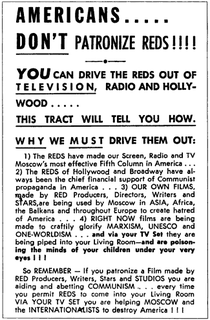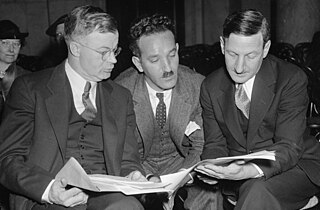
McCarthyism is the practice of making accusations of subversion and treason, especially when related to communism and socialism. The term originally referred to the controversial practices and policies of U.S. Senator Joseph McCarthy (R-Wisconsin), and has its origins in the period in the United States known as the Second Red Scare, lasting from the late 1940s through the 1950s. It was characterized by heightened political repression and persecution of left-wing individuals, and a campaign spreading fear of alleged communist and socialist influence on American institutions and of espionage by Soviet agents. After the mid-1950s, McCarthyism began to decline, mainly due to Joseph McCarthy's gradual loss of public popularity and credibility after several of his accusations were found to be false, and sustained opposition from the U.S. Supreme Court led by Chief Justice Earl Warren on human rights grounds. The Warren Court made a series of rulings on civil and political rights that overturned several McCarthyist laws and directives, and helped bring an end to McCarthyism.

The Internal Security Act of 1950, 64 Stat. 987, also known as the Subversive Activities Control Act of 1950, the McCarran Act after its principal sponsor Sen. Pat McCarran (D-Nevada), or the Concentration Camp Law, is a United States federal law. Congress enacted it over President Harry Truman's veto. It required Communist organizations to register with the federal government. The emergency detention provision was repealed when the Non-Detention Act of 1971 was signed into law by President Richard Nixon.
Joint Anti-Fascist Refugee Committee v. McGrath, 341 U.S. 123 (1951), was a United States Supreme Court case that held that groups could sue to challenge their inclusion on the Attorney General's List of Subversive Organizations. The decision was fractured on its reasoning, with each of the Justices in the majority writing separate opinions.

Nathan Witt, born Nathan Wittowsky, was an American lawyer who is best known as being the Secretary of the National Labor Relations Board (NLRB) from 1937 to 1940. He resigned from the NLRB after his communist political beliefs were exposed and he was accused of manipulating the Board's policies to favor his own political leanings. He was also investigated several times in the late 1940s and 1950s for being a spy for the Soviet Union in the 1930s. No evidence of espionage was ever found.
The Civil Rights Congress (CRC) was a United States civil rights organization, formed in 1946 at a national conference for radicals and disbanded in 1956. It succeeded the International Labor Defense, the National Federation for Constitutional Liberties, and the National Negro Congress, serving as a defense organization. Beginning about 1948, it became involved in representing African Americans sentenced to death and other highly prominent cases, in part to highlight racial injustice in the United States. After Rosa Lee Ingram and her two teenage sons were sentenced in Georgia, the CRC conducted a national appeals campaign on their behalf, their first for African Americans.
The Subversive Activities Control Board (SACB) was a United States government committee to investigate Communist infiltration of American society during the 1950s Red Scare. It was the subject of a landmark United States Supreme Court decision of the Warren Court, Communist Party v. Subversive Activities Control Board, 351 U.S. 115 (1956), that would lead to later decisions that rendered the Board powerless.

President Harry S. Truman signed United States Executive Order 9835, sometimes known as the "Loyalty Order", on March 21, 1947. The order established the first general loyalty program in the United States, designed to root out communist influence in the U.S. federal government. Truman aimed to rally public opinion behind his Cold War policies with investigations conducted under its authority. He also hoped to quiet right-wing critics who accused Democrats of being soft on communism. At the same time, he advised the Loyalty Review Board to limit the role of the Federal Bureau of Investigation (FBI) to avoid a witch hunt. The program investigated over 3 million government employees, just over 300 of whom were dismissed as security risks.
Jencks v. United States, 353 U.S. 657 (1957), is a U.S. Supreme Court case.

The Alien Registration Act, popularly known as the Smith Act, 76th United States Congress, 3d session, ch. 439, 54 Stat. 670, 18 U.S.C. § 2385 is a United States federal statute that was enacted on June 28, 1940. It set criminal penalties for advocating the overthrow of the U.S. government by force or violence, and required all non-citizen adult residents to register with the federal government.

The Supreme Court of the United States handed down nineteen per curiam opinions during its 2009 term, which began on October 5, 2009, and concluded October 3, 2010.
Aptheker v. Secretary of State, 378 U.S. 500 (1964), was a landmark decision of the US Supreme Court on the right to travel and passport restrictions as they relate to Fifth Amendment due process rights and First Amendment free speech, freedom of assembly and freedom of association rights. It is the first case in which the US Supreme Court considered the constitutionality of personal restrictions on the right to travel abroad.
The Mundt–Ferguson Communist Registration Bill was a proposed law that would have required all members of the Communist Party of the United States register with the Attorney General.
Wieman v. Updegraff, 344 U.S. 183 (1952), is a unanimous ruling by the United States Supreme Court which held that Oklahoma loyalty oath legislation violated the due process clause of the Fourteenth Amendment to the United States Constitution because it did not give individuals the opportunity to abjure membership in subversive organizations. Due process requires that individuals have scienter, and the Oklahoma statute did not accommodate this requirement.

The Supreme Court of the United States handed down thirteen per curiam opinions during its 2011 term, which began October 3, 2011 and concluded September 30, 2012.

The Smith Act trials of Communist Party leaders in New York City from 1949 to 1958 were the result of US federal government prosecutions in the postwar period and during the Cold War between the Soviet Union and the United States. Leaders of the Communist Party of the United States (CPUSA) were accused of violating the Smith Act, a statute that prohibited advocating violent overthrow of the government. The defendants argued that they advocated a peaceful transition to socialism, and that the First Amendment's guarantee of freedom of speech and of association protected their membership in a political party. Appeals from these trials reached the US Supreme Court, which ruled on issues in Dennis v. United States (1951) and Yates v. United States (1957).
Noto v. United States, 367 U.S. 290 (1961), was a 1961 United States Supreme Court case that reversed the felony conviction of a lower-echelon official of the Communist Party USA (CPUSA).

The Mundt–Nixon Bill, named after Karl E. Mundt and Richard Nixon, formally the Subversive Activities Control Act, was a proposed law in 1948 that would have required all members of the Communist Party of the United States register with the Attorney General.
Joseph Forer (1910–1986) was a 20th-Century American attorney who, with partner David Rein, supported Progressive causes including discriminated communists and African-Americans. Forer was one of the founders o the National Lawyers Guild and its DC chapter. He was also an expert in the "Lost Laws" of Washington, DC, enacted in 1872–1873, that outlawed segregation at business places.

William Albertson was a 20th-century American leader in the Communist Party of the USA who battled federal and state courts, and who in 1964 was framed by the Federal Bureau of Investigation, which was only discovered posthumously in 1975. His widow made an out-of-court settlement in 1989 with the U.S. Government for $170,000.







